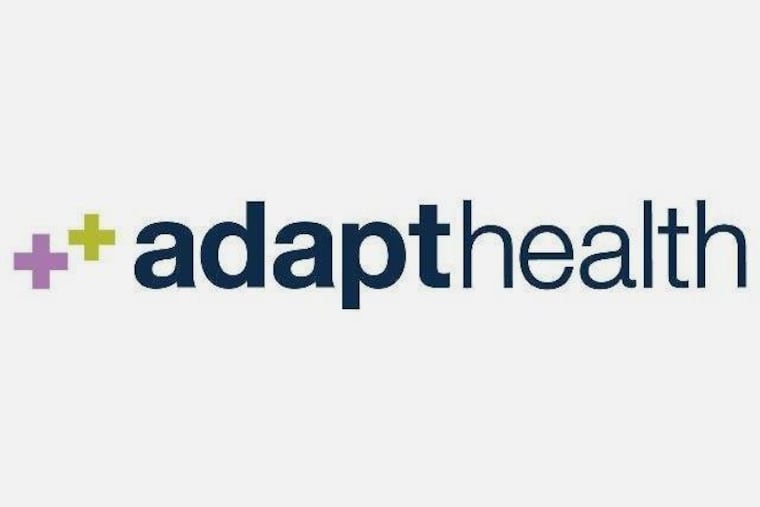AdaptHealth follows $30M McKesson deal with Advanced pact; Roche-Spark nears deadline
AdaptHealth buys McKesson unit for $30M; Spark-Roche deal held til December

UPDATE 12/9: AdaptHealth Corp., the Plymouth Meeting home-medical-equipment company that’s been rapidly acquring rivals, said Monday it plans to buy the home-medical-equipment business of Advanced Home Care, which supplied $83 million worth of breathing machines, oxygen and other durable equipment to patients via 23 offices in Georgia, the Carolinas, Virginia and Tennessee in the year ending Sept. 30.
AdaptHealth didn’t say what it’s paying for the Advanced unit. Last month it said it will pay $30 million for a unit of McKesson with sales of $134 million a year. If it paid a similar multiple for the new business, the second deal would cost around $19 million; deal prices can also vary based on growth and assets, as well as sales.
The seller is a joint-venture of 12 Southern regional hospitals. AdaptHealth expects to continue supplying those hospitals after closing the sale. AdaptHealth plans to continue occupying Advanced’s offices in High Point, N.C. and will hire its management team, headed by CEO Joel Mills. In a statement, Mills called AdaptHealth President Josh Parnes’ management “a forward-thinking team.”
11/22: AdaptHealth Corp., the Plymouth Meeting company that has been buying up other home-medical equipment suppliers in hopes federal Medicare and Medicaid will pay more over the next couple of years, has agreed to pay $30 million for hospital-supply giant McKesson Corp.'s Patient Care Solutions unit.
The deal is “an important step in our continuing growth as an industry consolidator,” said Luke McGee, the career investment banker who has served as AdaptHealth CEO since the company’s founding as QMES Inc. in 2012.
AdaptHealth says the deal includes an agreement to supply McKesson customers. The company employs 2,400, including around 750 at its Blue Bell offices and elsewhere in the Philadelphia area.
AdaptHealth says it is the third-largest U.S. home-medical supplier, after German gas bottler Linde’s Lincare unit, and Blackstone Group’s Apria Healthcare.
McKesson PCS ships ostomy and urological supplies -- which are new products for AdaptHealth -- along with incontinence, diabetic-care supplies, and breast pumps, direct to U.S. patients, and through relationships with their doctors and hospitals.
The McKesson PCS group sold $134 million in supplies during the 12 months ended Oct. 31. That’s equal to about 25 percent of AdaptHealth’s sales during the same period. AdaptHealth in statements to the Securities and Exchange Commission has said it is not yet profitable due to the costs of its ongoing acquisitions.
McGee expects the deal could double AdaptHealth’s market by opening new sales channels through McKesson’s large customer network.
The McKesson unit also “complements our existing PAP [sleep] resupply offering,” for sleep-apnea patients and others with breathing issues, noted Josh Parnes, AdaptHealth’s board chairman.
AdaptHealth, became a public company earlier this month when it completed its merger with DFB Healthcare Acquisitions Corp., a publicly traded holding company set up by investor Deerfield Management of New York.
:The company was listed on the Nasdaq stock market following an investment commitment of $353 million by Deerfield, investor Richard Barasch, and others, to buy out earlier investors and fund growth and new acquisitions.
AdaptHealth makes more than 7,000 deliveries a day to patients insured by Medicare, Medicaid, employers, and private insurance policies. Besides disease-specific equipment, AdaptHealth also ships wheelchairs, walkers, and hospital-style beds.
The company has made 64 acquisitions -- and plans more -- in its campaign to boost sales, drive down costs, and increase profits.
Barasch told The Inquirer last summer that the total home-medical equipment market tops $12 billion in yearly sales and should grow faster than the economy for at least the next several years, increasing potential sales and profits.
Barasch was chief executive of Universal American Corp., the health insurance company, before he sold it to WellCare Health Plans Inc. in 2017 and went into the supply business.
Separately, Roche Holdings Inc., the Swiss drug giant, has agreed to again extend its offer to buy Philadelphia-based Spark Therapeutics for $114.50 a share, totaling more than $4 billion, into December.
“The offer was extended to provide additional time for the U.S. Federal Trade Commission and the U.K. Competition and Markets Authority to complete their previously disclosed reviews of Roche’s pending acquisition of Spark,” Roche said in this statement, adding that the companies are committed to the deal.
The offer has been extended several times, most recently until Nov. 25, and has now been pushed back to a deadline at 5 p.m. Eastern time on Dec. 10.
As with Spark’s 2015 IPO, the Roche deal, based on the Swiss company’s expectation it will use Spark technology to market a series of gene-therapy treatments, has energized investors in biotech and related start-up companies, though many of the companies have modest, if any, sales and have not yet become profitable.